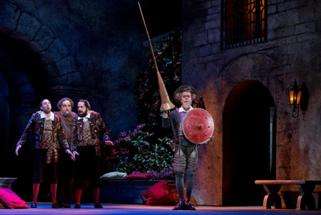|
Back
Lilting at Windmills Melbourne
State Theatre
05/03/2018 - & May 5, 9, 12, 2018
Jules Massenet: Don Quichotte
Ferruccio Furlanetto (Don Quichotte), Sian Pendry (Dulcinée), Warwick Fyfe (Sancho Pança), Graeme Macfarlane (Rodriguez), John Longmuir (Juan), Jane Ede (Pédro), Anna Dowsley (Garcias), Jonathan McCauley (Ténébrun), Adam Player, Ryan Sharp, Malcolm Ede, Clifford Plumpton (Bandits), Gerard Mapstone (Guitarist)
Opera Australia Chorus, Anthony Hunt (Chorus Master), Orchestra Victoria, Yi Wang (Concert Master), Guillaume Tourniaire (Conductor)
John Sheedy (Revival Director), Ralph Funicello (Set Designer for San Diego Opera), Missy West (Costume Designer for San Diego Opera), Marie Barrett & Chad R Jung (Lighting Designers), Tomás Dietz (Choreographer)

F. Furlanetto (© Jeff Busby)
Continuing the theme of imported stars for this Melbourne season, Opera Australia gave Massenet’s infrequently performed Don Quichotte with Italian super-star basso Ferruccio Furlanetto. Frequently dismissed as old-fashioned and out of taste, Massenet’s opera is like so many of his other works, rarely heard. That is, until a stellar performer who can act as well as he sings, can breathe life into a somewhat two-dimensional comic book character. In collaboration with San Diego Opera, this 2009 production, originally staged with Mr Furlanetto relies on his astounding ability to bring the Knight Errant to life.
The design of the production sits between comic book and old world theatricality. Towering stone walls, billowing gauze curtains, extensive trails of artificial flowers and copious amounts of plump colourful cushions are the background for the first and fourth acts. They contrast sharply with dead trees, rocky mountain passes and endless horizons in the other three acts. Missy West’s costume design is just as “old school” – brightly coloured, flowing gowns, tight-trousered, bolero-ed flamenco dancers, sitting alongside a slightly tarnished knight-in-armour and his dishevelled side-kick.
The early parts of the score for this opera lack grand singing elements, opting instead for gently developing melodic lines and relying upon rousing dance tunes. Strangely, this works in the overall piece to focus our attention on the elaboration of the humour and pathos of the situation. It allows us to naturally acquire the love and devotion Sancho Panza has developed for his master. The decision to intersperse the early act scene changes with orchestral selections of Massenet’s ballet music from Le Cid allowed forgiveness for the lack of inspired arias and ensembles in the early scenes. Nevertheless, over the entire opera, the score builds towards the rapturously beautiful and lilting melody of the fourth act and the immense drama of the death of Quichotte at the conclusion.
French conductor Guillaume Tourniaire has built an extensive repertoire with Opera Australia. He brings a depth of understanding to Massenet’s score which drew from Orchestra Victoria a rich variety of colours and emotions. The beautiful instrumental solos in this opera, most notably for the cello, touched emotions unachievable with a full band. The wind and brass sections gave wonderful performances, embellishing the on-stage action. Throughout the show, Maestro Tourniaire used a “play-through” technique, even in the orchestral interludes which gave little opportunity for the audience to show its appreciate for the Orchestra. The curtain calls amply made up for any sense of loss as the audience threw itself into a rousing acknowledgement of the performance from the band.
Returning to Australia after previous appearances as King Phillip and in 2017 in a recital of Russian songs, Ferruccio Furlanetto left no doubt that this signature role allows us to see and hear a performer at the very pinnacle of his art. The voice is amazingly varied: at times and brilliant as the brass section accompanying him and at others as sweet and soft as the shimmering fabrics of Dulcinea’s gowns. We hear finely-crafted timbers, age-burnished leather and richly-polished pewter in his voice. It is an instrument of sublime subtlety and commanding presence. Mr Furlanetto’s acting is as accomplished as his vocal ability. He is completely at one with this character and brings a dimension of reality to the exalted aspirations of Quichotte without which the character and indeed the opera would be bland and uninteresting.
Beside the Don must be a trusty squire and foil in the character of Sancho Panza. Cervantes’s “everyman”, this character recalls the worldly concerns of all of us: where will I live? How will I feed myself? Who will look after me? But at the same time he sees worthiness in the glorious madness of his master through the lenses of practicality and duty. Warwick Fyfe has built an astounding career with Opera Australia and internationally. From his brilliant depiction of Alberich to his guilt-riddled Rigoletto, Mr Fyfe continues to expand his repertoire with this wonderful portrait of a simple man struggling to assimilate higher principles into the ordinariness of his life. Exquisitely sung and varying from throw-away comedy to the powerfully emotional duet which concludes the fourth act, Mr Fyfe continues to surprise and delight audiences with his skilfully balanced acting and singing roles.
Australia Mezzo Sian Pendry also continues to develop an extensive repertoire with this company. As “La Belle Dulcinée”, she has a difficult role in this opera. There are only few moments where she can command the stage in solo rendition and these frequently do not give her the opportunity to develop the character beyond the “unattainable beauty” whose frivolous life represents the antithesis of the Don’s elevated aspirations. In Act four however, she adds depth and strength to this character that must eventually be the downfall of the dignified old Knight. Ms Pendry’s voice is broad of range and most powerful in its dark and lustrous lower register.
A simplified version of the great novel, this telling of Cervantes’s story rises above the two dimensionality of a comic book to moments of great pathos. The production is beautiful to watch and riveting for the opportunity to witness a master of the craft in Mr Furlanetto.
Gregory Pritchard
|